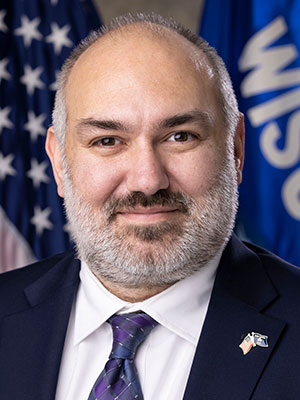
Feb. 1, 2023 – State Treasurer John Leiber’s childhood vision of attending law school didn’t involve online classes and pandemic lockdowns.
“I always wanted to get my law degree when I was younger,” Leiber said. “I started in 2019 and Covid hit one semester later. It was a very unusual law school experience.”
Leiber, a Republican from Racine, graduated from the U.W. Law School in 2021.
“There wasn’t really much else to do except study,” Leiber said of attending law school during the height of the pandemic.
“I couldn’t go anywhere. I was able to double up on some classes and finish a semester early. It all kind of worked out.”
Not Done with Politics After All
Prior to going to law school, Leiber served as a legislative assistant in the Capitol. But running for office wasn’t in his plans when he went to law school.
“Right before I went to law school I ran for the Assembly and lost,” Leiber said. “I thought, ‘O.K., I’m done with politics.’ I’m going to start a new career.”
But four months after he obtained his J.D., he found himself running for state treasurer.
Eye on the Prize
Leiber said he kept his eyes on the treasurer’s office during his days as a legislative assistant in the Capitol, a period that included a 2018 referendum on whether to abolish the office.
 Jeff M. Brown is a legal writer for the State Bar of Wisconsin, Madison. He can be reached by email or by phone at (608) 250-6126.
Jeff M. Brown is a legal writer for the State Bar of Wisconsin, Madison. He can be reached by email or by phone at (608) 250-6126.
Beginning in 2003, a series of legislative enactments removed powers and duties from the office. But voters overwhelmingly defeated the 2018 referendum.
Leiber decided to run for the post after watching Aaron Richardson, the Democratic nominee.
“This last year I looked at who was running for it and what they wanted to do, and I thought, ‘That’s really not what the office is set up to do anymore.’”
Sole Job is Trust Management
In Wisconsin, the state treasurer has but one duty: serve as one of three members of the Board of Commissioners of Public Lands (the other two members are the secretary of state and the attorney general).
The board manages 77,000 acres of state land and a $1.3 billion trust fund, which allocates money to public schools.
“What it really is, is trust management,” Leiber said. “It made me realize that this isn’t a job for an accountant anymore. It feels like someone with a law degree would fit perfectly because a lot of lawyers do trust management.”
The board has met only once since Leiber was elected last November. But he said that his law degree seems like a good fit for the position.
“It’s good to have a background that allows me to understand how a board functions and what the duties are,” Leiber said.
Law Degree Is an Asset
Leiber said his law degree helps in ways beyond understanding trust management.
“It really does help to understand what the laws that are being passed are going to do once they’re in place,” Leiber said.
“It helps to think a couple of steps ahead. How does it interact with the other statutes, what are some of the downfalls? A lot of bills have great intentions but sometimes there are unforeseen consequences.”
Leiber’s law degree also comes in handy when discussing the ramifications of bills with legislators and other elected officials, an increasing number of whom are not lawyers.
“What happens once a law is passed?” Leiber said. “How is that going to affect not just regular people, but how is that going to play in the courtroom, how is that going to play in businesses trying to comply with a new law?”
Meet Wisconsin’s Lawyer-Legislators
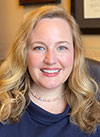
Sen. Kelda
Roys
(D-Madison) | |
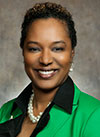
Sen. Lena
Taylor
(D-Milwaukee) |
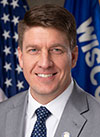
Sen. Eric
Wimberger
(R-Green Bay) | |
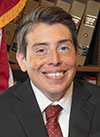
Rep. Jimmy
Anderson
(D-Fitchburg) |
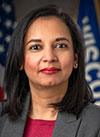
Rep. Marisabel
Cabrera
(D-Milwaukee) | |
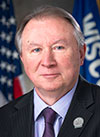
Rep. Steve
Doyle
(D-Onalaska) |
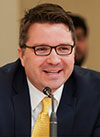
Rep. Evan
Goyke
(D-Milwaukee) | |
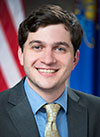
Rep. Thaddeus “Tip”
McGuire
(D-Kenosha) |
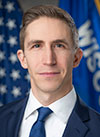
Rep. Daniel
Riemer
(D-Milewaukee) | |
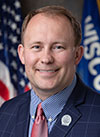
Rep. Ron
Tusler
(R-Harrison) |
Hopeful at Start of his Tenure
Leiber said he’s pleasantly surprised that legislators and officials from both sides of the aisle, including Governor Tony Evers, a Democrat, have been willing to talk to him.
“I’m hoping we accomplish some things together,” Leiber said.
Any contributions from the treasurer’s office will be Leiber’s alone. The reduction in the office’s duties and powers has left the treasurer with no staff.
“It’s tough starting from scratch, because you don’t have that institutional knowledge when there’s staff there,” Leiber said.
‘Go for it’
What advice does Leiber have for State Bar members who are thinking about running for office?
“Go for it,” Leiber said. “It’s actually very rewarding. Campaign season is tough, but once you’re in office, you’re actually able to make a difference. You’re able to get things done. It’s very rewarding to know that you’ve given back to the community.”
Leiber isn’t the only statewide elected official who’s a lawyer. Attorney-General Josh Kaul, a Democrat who won a second term in last November’s election, is also a State Bar member. But the number of attorneys in the Wisconsin Legislature is dwindling.
Statehouse Numbers Shrink
Among the state legislature’s 132 members, 10 are lawyer-legislators.
That number is down two from last session. Over the last five decades, the number of lawyer-legislators in Wisconsin has declined.
According to
a 2016 article in
Marquette Lawyer, 32 of Wisconsin’s 132 legislators (24%) were lawyers in the 1969-1970 session. In the 1999-2000 session, there were 15 lawyer-legislators (11%). The number dropped to 12 (9%) for the 2012-2013 session.
The decline in Wisconsin is part of a national trend.
According to a 2015 report issued by the National Council of State Legislatures (NCSL) cited in the
Marquette Lawyer article, 14% of state legislators nationwide listed “lawyer” as their profession. That number was 22.3% in 1976, the NCSL report said.
Similar Decline at Federal Level
There’s been a similar decline in the number of lawyer-legislators in Congress.
According to a
report by political scientist Nick Robinson, nearly 80% of Congressional members in the mid-1800s were lawyers. The number of lawyers serving in Congress dropped to under 60% in the 1960s; by 2015, it stood at less than 40%.
